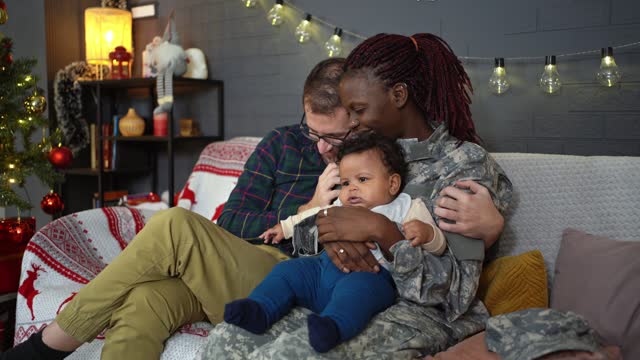Family conflicts at Christmas: 5 practical tips on what to do
In spite of the picture of a perfect Christmas that is depicted for us in movies, commercials, and other forms of media, the reality is that for some individuals, the holiday season is very different from what is shown in these forms of media.
Table of Contents
ToggleThe recollection of Christmas-related childhood memories, getting together with relatives with whom we may not have a good relationship, the knowledge that the absence of some people who will not be with us again, having to get in touch with your ex-partner to organize Christmas so that you can be with the children, and other circumstances can put us in a state of anxiety that is difficult to manage.
On the other hand, some families may experience an increase in stress due to the fact that they will be spending more time together around the holidays than throughout the rest of the year.

In addition, the current state of our health requires that we alter some of how we organize ourselves this year in relation to these dates, which may result in an increase in the number of disagreements that arise.
Every individual is dealing with their own unique set of circumstances, which might result in a wide variety of challenges or complications.
individuals who do not have families or who do not have the opportunity to meet their relatives, individuals who have just married or who have recently been reunited with their own and in-laws, and people who do not have families or who do not have the opportunity to meet their relatives are all examples of circumstances that will include diverse feelings and situations to handle.
In order to do this, it is essential to consider a few concerns that, on the whole, may assist us in making it through this time in a manner that is more to our liking.
It is not Christmas that causes the conflict
The source of these tensions is most likely something that has been around for a very long time or a worry that we have expressed at a variety of different occasions at events that entail meetings.

It is fascinating to think that we may use this time as an opportunity to change the way we go about things in order to get a new set of outcomes.
Let’s accept that no family is perfect
It is to be expected that there to be times of tension, friction, and arguments among families. If we can determine what it is that often leads to these arguments, then perhaps we can take steps to avoid the circumstances that are typically the catalyst for conflict when it occurs.
Let’s try to be empathetic
Even while not all possible outcomes may be rationally justified, there are instances when we can consider what these disagreements signify for other people. Despite the fact that it plainly makes us feel uncomfortable, there are occasions when we may try to put ourselves in the shoes of others, such as our partner or our children.

It is also essential to have the realization that every individual possesses their own sets of strengths and weaknesses and that there are certain facets that we will not view in the same manner. If we want to have more pleasant interactions, we should strive to steer clear of contentious subjects and look instead for ones that are more neutral.
Set limits
When we let the other person know how we feel or what the situation is causing us, it may sometimes benefit us, both in terms of bringing the matter to the attention of the other person and in terms of helping to keep the dispute from becoming worse.
It’s possible that the other person does not realize that what they are saying to us is insulting, that it makes us feel uncomfortable, or that it is not humorous.
Christmas Fact For You:

An estimated 85 percent of American kids believe in Santa Claus. The average age when children stop believing is eight, according to the 2018 International Exeter Santa Survey.
Know the times
Remember that the time we are spending together as a family is not the appropriate setting for resolving any disagreements we may have with other people who are attending the gathering. It is possible that delaying that encounter or having the ability to chat in private would be more convenient.
How to address the problem through psychotherapy?
We are able to address the potential for these sorts of arguments to arise within the family throughout the course of therapy. If we have a better understanding of the kind of interaction and communication that exists between the individual who seeks therapy and their family, then we will be better able to comprehend the norms and routines upon which these issues are founded.
As a result, one is also able to develop self-knowledge regarding the position, function, and responsibilities that they play within the family, and they are able to alter those roles as necessary.
In a similar vein, the origin of some triggers in family conflicts may be traced back to implicit and explicit rules, loyalties, myths and conventions, and/or taboo subjects. Personal disputes are sometimes also entangled in these issues, with the handling of conflicts in general, our way of reading reality, personal worries, and so on being major factors in the discussion.

The consultation may be turned into a scenario in which we prepare for these types of circumstances, learning communication methods, conflict resolution, and other skills that allow us to enjoy getting together with our families for get-togethers and reunions.
Some of the strategies that may be utilized include avoiding further escalations, maintaining emotional control, and breaking free of previously problematic behaviors and cognitive patterns in order to replace them with more adaptive alternatives.
Conclusion
Navigating family conflicts during Christmas can be emotionally challenging, but these five practical tips provide a roadmap to a more harmonious holiday season.
By setting clear boundaries, practicing active listening, seeking compromise, and focusing on empathy and understanding, it’s possible to defuse tensions and promote healthier interactions. Remember that conflicts are a natural part of family dynamics, and the holiday season can amplify existing issues.
However, by approaching these challenges with patience and a commitment to fostering positive connections, you can transform conflicts into opportunities for growth, ultimately ensuring that the spirit of togetherness and love prevails during this special time of year.
- Facebook0
- Twitter0
- Pinterest0
- LinkedIn0
- 0 shares





